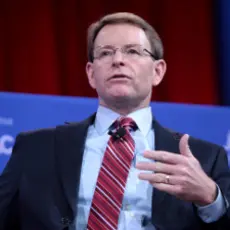The Religious Right activists who frequently claim that they are simply seeking to “live and let live” in a country that increasingly favors LGBT rights and other social progress sometimes compare themselves to the Pilgrims, citing the historical myth that the American concept of religious liberty originated with early Puritan governments.
Tony Perkins, president of the Family Research Council, made this argument on his “Washington Watch” radio program today in response to a caller who claimed that the arrest of Kim Davis, the Kentucky clerk who attempted to bar her entire office from issuing marriage licenses to same-sex couples, portends laws making it “illegal to pray in the military” and is reminiscent of Nazi “legislation trying to annihilate the Jews.”
“It’s just kind of sad that if you have religious beliefs you can’t be an elected official,” the caller said.
Perkins agreed, attacking the “intentional” “misconception” that “religious liberty is simply the freedom to pick the church of your choice” rather than the freedom of people like Kim Davis to impose their religious views on everyone else.
“Do you really think that William Bradford and the Pilgrims came to America, to this land, seeking just to move their church membership because they couldn’t find a church that they really liked there in England or Holland, where they were before they came back to England?” he asked. “I don’t think so. And, in fact, they had religious freedom in Holland but they didn’t have the ability to build community and a framework to live under based on their religious freedom. That’s why they risked it all to come to what we now know as the United States of America.”
“They came here for the same thing that Kim Davis is asking for,” he said, “religious freedom. Not freedom of worship, but the freedom of religion.”
Perkins may have accidentally made the perfect Kim Davis analogy. The Puritans traveled to Plymouth Colony after a stint in Holland where, as historian Robert Tracy McKenzie notes, they “encountered a religious tolerance almost unheard of in that day and age.” In America, he writes, “they hoped to live by themselves, enjoy the same degree of religious liberty and earn a ‘better and easier’ living.” In doing so, they set up a theocracy, where, as PBS writes, they sought “religious freedom—but only for themselves.”
Perkins is absolutely right that Kim Davis and her supporters are seeking something similar to what the Pilgrims sought in the 17th century : not the freedom of religion, but a religious state, governed by them.






